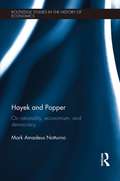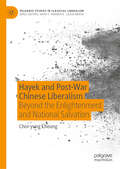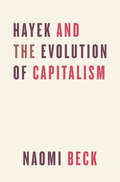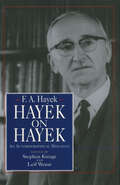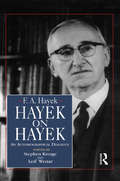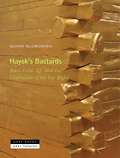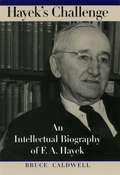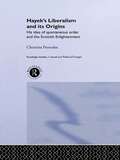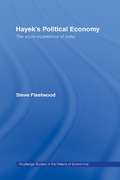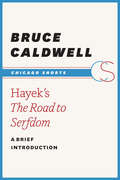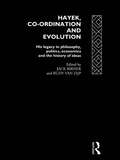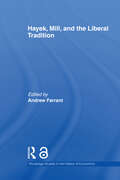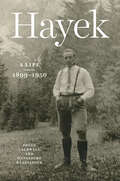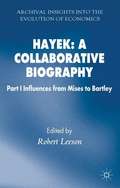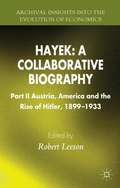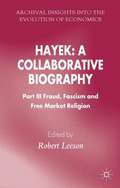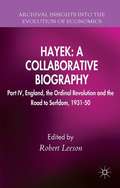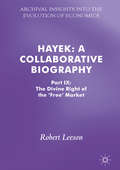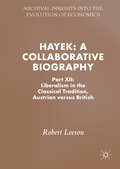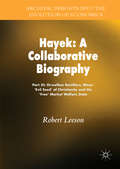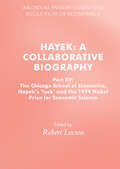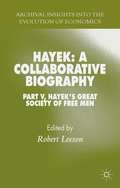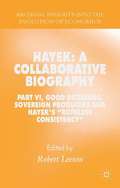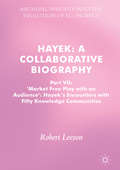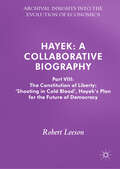- Table View
- List View
Hayek and Popper: On Rationality, Economism, and Democracy (Routledge Studies in the History of Economics)
by Mark NotturnoKarl Popper and Friedrich von Hayek are remembered as two of the twentieth century’s greatest proponents of open society. However, over the years, Hayek’s ideas have tended to be favoured over Popper’s in both academic and political discussions. This book aims to improve understanding of Popper’s and Hayek’s philosophies by explaining their differences, and whilst doing so, to encourage liberal political philosophers to take a better-informed and more sympathetic look at Popper’s ideas about open society. Popper and Hayek differed in subtle but fundamental ways about rationality, economism, and democracy. They thus differed about whether and to what extent society is well served by deliberate attempts at social engineering and government intervention in the economy. They also differed about whether democracy is better served by institutions designed to elect the best leaders, or by institutions designed to protect us against the leaders we elect. And they differed, perhaps most importantly, about whether we should value freedom as a means to prosperity or an end-in-itself. This book argues that Hayek’s views about rationality, economism, and democracy are fundamentally at odds with Popper’s¾ and perhaps even with open society itself—and that the unintended consequences of Hayek’s views may actually pose a threat to Popper’s vision of a liberal and free open society.
Hayek and Post-War Chinese Liberalism: Beyond the Enlightenment and National Salvation (Palgrave Studies in Classical Liberalism)
by Chor-yung CheungThis book is a study of comparative social and political theory, examining how Hayek’s classical liberalism has been influencing the development of Chinese liberalism since 1949. While both Chinese liberalism and the thought of Hayek can each be studied in its own right, this is the first systematic study on how Hayek’s ideas have helped post-war Chinese liberals enrich their social and political theory in the pursuit of freedom and in formulating theoretical responses to the challenges of modernity in China. This book examines and identifies those central theoretical tenets of Hayek that are most inspiring to the post-war Chinese liberals in their efforts in developing a more robust and profound understanding of freedom in the Chinese context. It argues that the new post-war understanding of Chinese liberalism has superseded the social democratic understanding that was widely adopted by pre-war Chinese liberals. These theoretical/Hayekian tenets include: the critique of totalitarianism and scientism, the idea of the free market, the insights inherited from the Scottish Enlightenment to counter the excess of Cartesian Rationalism, the thesis of the concurrent evolution of culture and mind, and the central importance of the rule of law in defending individual freedom. This book aims to help political theorists and historians of comparative political thought both in the East and in the West better understand the intellectual issues involved and explore further research endeavours in the same area.
Hayek and the Evolution of Capitalism
by Naomi BeckFew economists can claim the influence—or fame—of F. A. Hayek. Winner of the Nobel Prize, Hayek was one of the most consequential thinkers of the twentieth century, his views on the free market echoed by such major figures as Ronald Reagan and Margaret Thatcher. Yet even among those who study his work in depth, few have looked closely at his use of ideas from evolutionary science to advance his vision of markets and society. With this book Naomi Beck offers the first full-length engagement with Hayek’s thought from this perspective. Hayek argued that the capitalism we see in advanced civilizations is an unintended consequence of group selection—groups that adopted free market behavior expanded more successfully than others. But this attempt at a scientific grounding for Hayek’s principles, Beck shows, fails to hold water, plagued by incoherencies, misinterpretations of the underlying science, and lack of evidence. As crises around the globe lead to reconsiderations of the place of capitalism, Beck’s excavation of this little-known strand of Hayek’s thought—and its failure—is timely and instructive.
Hayek on Hayek: An Autobiographical Dialogue ( The Collected Works of F. A. Hayek)
by F. A. HayekThe crumbling of the Berlin Wall, the fall of the iron curtain, and the Reagan and Thatcher "revolutions" all owe a tremendous debt to F. A. Hayek. Economist, social and political theorist, and intellectual historian, Hayek passionately championed individual liberty and condemned the dangers of state control. Now Hayek at last tells the story of his long and controversial career, during which his fortunes rose, fell, and finally rose again. Through a complete collection of previously unpublished autobiographical sketches and a wide selection of interviews, Hayek on Hayek provides the first detailed chronology of Hayek's early life and education, his intellectual progress, and the academic and public reception of his ideas. His discussions range from economic methodology and the question of religious faith to the atmosphere of post-World War I Vienna and the British character. Born in 1899 into a Viennese family of academics and civil servants, Hayek was educated at the University of Vienna, fought in the Great War, and later moved to London, where, as he watched liberty vanish under fascism and communism across Europe, he wrote The Road to Serfdom. Although this book attracted great public attention, Hayek was ignored by other economists for thirty years after World War II, when European social democracies boomed and Keynesianism became the dominant intellectual force. However, the award of the Nobel Prize in economics for 1974 signaled a reversal in Hayek's fortunes, and before his death in 1992 he saw his life's work vindicated in the collapse of the planned economies of Eastern Europe.Hayek on Hayek is as close to an autobiography of Hayek as we will ever have. In his own eloquent words, Hayek reveals the remarkable life of a revolutionary thinker in revolutionary times. "One of the great thinkers of our age who explored the promise and contours of liberty....[Hayek] revolutionized the world's intellectual and political life"—President George Bush, on awarding F. A. Hayek the Medal of Freedom F. A. Hayek, recipient of the Medal of Freedom 1991 and the Nobel Memorial Prize in Economics in 1974, was a pioneer in monetary theory and the principal proponent of the libertarian philosophy. Hayek is the author of numerous books in economics, as well as books in political philosophy and psychology.
Hayek on Hayek: An Autobiographical Dialogue (The Collected Works of F.A. Hayek)
by Stephen KresgeThis book traces the life's work of a man now widely regarded as one of the greatest economists, political philosophers and social theorists of the century. The result is the most alive and accessible introduction to Hayek to date.
Hayek's Bastards: Race, Gold, IQ, and the Capitalism of the Far Right
by Quinn SlobodianHow neoliberals turned to nature to defend inequality after the end of the Cold WarNeoliberals should have seen the end of the Cold War as a total victory—but they didn&’t. Instead, they saw the chameleon of communism changing colors from red to green. The poison of civil rights, feminism, and environmentalism ran through the veins of the body politic and they needed an antidote.To defy demands for equality, many neoliberals turned to nature. Race, intelligence, territory, and precious metal would be bulwarks against progressive politics. Reading and misreading the writings of their sages, Friedrich Hayek and Ludwig von Mises, they articulated a philosophy of three hards—hardwired human nature, hard borders, and hard money—and forged the alliances with racial psychologists, neoconfederates, ethnonationalists, and goldbugs that would become known as the alt-right.Following Hayek&’s bastards from Murray Rothbard to Charles Murray to Javier Milei, we find that key strains of the Far Right emerged within the neoliberal intellectual movement not against it. What has been reported as an ideological backlash against neoliberal globalization in recent years is often more of a frontlash. This history of ideas shows us that the reported clash of opposites is more like a family feud.
Hayek's Challenge: An Intellectual Biography of F.A. Hayek
by Bruce CaldwellFriedrich A. Hayek is regarded as one of the preeminent economic theorists of the twentieth century, as much for his work outside of economics as for his work within it. During a career spanning several decades, he made contributions in fields as diverse as psychology, political philosophy, the history of ideas, and the methodology of the social sciences. Bruce Caldwell—editor of The Collected Works of F. A. Hayek—understands Hayek's thought like few others, and with this book he offers us the first full intellectual biography of this pivotal social theorist. Caldwell begins by providing the necessary background for understanding Hayek's thought, tracing the emergence, in fin-de-siècle Vienna, of the Austrian school of economics—a distinctive analysis forged in the midst of contending schools of thought. In the second part of the book, Caldwell follows the path by which Hayek, beginning from the standard Austrian assumptions, gradually developed his unique perspective on not only economics but a broad range of social phenomena. In the third part, Caldwell offers both an assessment of Hayek's arguments and, in an epilogue, an insightful estimation of how Hayek's insights can help us to clarify and reexamine changes in the field of economics during the twentieth century. As Hayek's ideas matured, he became increasingly critical of developments within mainstream economics: his works grew increasingly contrarian and evolved in striking—and sometimes seemingly contradictory—ways. Caldwell is ideally suited to explain the complex evolution of Hayek's thought, and his analysis here is nothing short of brilliant, impressively situating Hayek in a broader intellectual context, unpacking the often difficult turns in his thinking, and showing how his economic ideas came to inform his ideas on the other social sciences.Hayek's Challenge will be received as one of the most important works published on this thinker in recent decades.
Hayek's Liberalism and Its Origins: His Idea of Spontaneous Order and the Scottish Enlightenment (Routledge Studies in Social and Political Thought #25)
by Christina PetsoulasBy exploring the writings of Mandeville, Hume and Smith, this book offers a critique of Hayek's theory of cultural evolution and explores the roots of his powerful defence of liberalism. This book is an original contribution to the debate, and vital reading for researchers in politics, political theory, and economics.
Hayek's Political Economy: The Socio-economics of Order (Routledge Studies in the History of Economics)
by Steve FleetwoodIn a society where no central agency coordinates the human activity of producing, selling and buying, why is there order and not chaos? This fundamental question has taxed generations of economists. Hayek's notion of spontaneous order goes some way to providing an answer.Hayek's Political Economy argues that afer explicitly rejecting positivism, Hayek was free to embrace reality and offer an explanation of the process involved in bringing about order.
Hayek's The Road to Serfdom: A Brief Introduction (Chicago Shorts)
by Bruce CaldwellThe Road to Serfdom, F. A. Hayek's 1944 warning against the dangers of government control, continues to influence politics more than seventy years after it was turned down by three American publishers and finally published by the University of Chicago Press. A classic work in political philosophy, intellectual and cultural history, and economics, the definitive edition of The Road to Serfdom included this essay as its Introduction. Here, acclaimed Hayek biographer and general editor of the Collected Works of F. A. Hayek series, Bruce Caldwell explains how Hayek came to write and publish the book, assesses misunderstandings of Hayek's thought, and suggests how Hayek's fears of Socialism lead him to abandon the larger scholarly project he had planned in 1940 to focus instead on a briefer, more popular and political tract--one that has influenced political and economic discourse ever since.
Hayek, Co-ordination and Evolution: His Legacy in Philosophy, Politics, Economics and the History of Ideas
by Jack Birner Rudy Van ZijpRecent years have witnessed a remarkable revival in Hayek's reputation as an economist, a political philosopher, and an intellectual historian. This book shows why this revival has taken place by demonstrating the continuing relevance and vitality of Hayek's ideas. A group of internationally known scholars, of both the left and the right, critically assess his contribution to economics, political philosophy, legal theory, cognitive psychology and the history of ideas.
Hayek, Mill and the Liberal Tradition (Routledge Studies In The History Of Economics Ser. #121)
by Andrew FarrantA PDF version of this book is available for free in open access via www.tandfebooks.com as well as the OAPEN Library platform, www.oapen.org. It has been made available under a Creative Commons Attribution-Non Commercial-No Derivatives 3.0 license and is part of the OAPEN-UK research project. This book considers the relationship between Hayek and Mill, taking issues with Hayek’s criticism of Mill and providing a broader perspective of the liberal tradition. Featuring contributions from the likes of Ross Emmett, Leon Montes and Robert Garnett, these chapters ask whether Hayek had an accurate reading of the ideas of Mill and Smith, as well as considering themes such as sympathy and analytical egalitarianism that play a large part in the liberal tradition, but less in work of Hayek These chapters argue that addition of these key ideas to the Hayekian corpus leads to a far broader understanding of the liberal tradition than that provided by Hayek
Hayek: A Life, 1899–1950 (The\collected Works Of F. A. Hayek Ser.)
by Bruce Caldwell Hansjoerg KlausingerA 2022 Economist Best Book of the Year. The definitive account of the distinguished economist’s formative years. Few twentieth-century figures have been lionized and vilified in such equal measure as Friedrich Hayek—economist, social theorist, leader of the Austrian school of economics, and champion of classical liberalism. Hayek’s erudite arguments in support of individualism and the market economy have attracted a devout following, including many at the levers of power in business and government. Critics, meanwhile, cast Hayek as the intellectual forefather of “neoliberalism” and of all the evils they associate with that pernicious doctrine. In Hayek: A Life, historians of economics Bruce Caldwell and Hansjörg Klausinger draw on never-before-seen archival and family material to produce an authoritative account of the influential economist’s first five decades. This includes portrayals of his early career in Vienna; his relationships in London and Cambridge; his family disputes; and definitive accounts of the creation of The Road to Serfdom and of the founding meeting of the Mont Pèlerin Society. A landmark work of history and biography, Hayek: A Life is a major contribution both to our cultural accounting of a towering figure and to intellectual history itself.
Hayek: Part I Influences from Mises to Bartley (Archival Insights Into the Evolution of Economics)
by Robert LeesonThis is the first collaborative biography of Hayek. Some of the world's most distinguished scholars will integrate the archival evidence with Hayek's published writings to illuminate the process by which Hayek changed the direction of world history.
Hayek: Part II Austria, America and the Rise of Hitler, 1899- 1933 (Archival Insights Into the Evolution of Economics)
by Robert LeesonA group of leading scholars from around the world use archival material alongside Hayek's published work to bring a new perspective on the life and times of one the 20th Century's most influential economists. This much awaited second volume details the life of Hayek from 1899 to1933 covering Hayek's time in Austria and the USA.
Hayek: Part III Fraud, Fascism and Free Market Religion (Archival Insights Into the Evolution of Economics)
by Robert LeesonIn 1984, F. A. Hayek, the co-leader of the Austrian free market neo-classical school, embraced the transparently fraudulent assertion made by Donald McCormick, aka Richard Deacon, in The British Connection (1979) which accused A. C. Pigou, the co-leader of the Cambridge market failure neo-classical school, of being a Soviet spy. Over lunch at the Reform Club with 'Deacon' McCormick, the former Sunday Times Foreign Manager, Hayek authenticated the fraudulent signature contained in a 1905 diary the essence of the case against Pigou. In this third volume of Hayek: A Collaborative Biography, a distinguished collection of academics and specialists examine 'Deacon' McCormick's fraudulent career: summarizing the large volume of incriminating evidence that was available to Hayek in 1984. Hayek's 1931 unsubstantiated assertion about having predicted the Great Depression was obviously matched by other equally unreliable assertions. That Hayek's assertions have been uncritically repeated by his disciples illuminates dynamics of that school. Austrian School economists who promote financial sector deregulation and climate change denial appear to resemble a free market religion rather than the scientific communities examined in other volumes in this series. "
Hayek: Part IV, England, the Ordinal Revolution and the Road to Serfdom, 1931- 50 (Archival Insights Into the Evolution of Economics)
by Robert LeesonThe study encompasses historical, social, political and economic viewpoints in examining Hayek's life and the history of economic thought. In the early 1930s, Hayek's business cycle work was apparently defeated by John Maynard Keynes and Piero Sraffa. However, Hayek had three successes. The Ordinal revolution, which undermined the foundations of welfare economics, was successfully transplanted from pre-war Austria and Lausanne to inter-war Britain. The Road to Serfdom (1944) attributed blame for Hitler not on those who funded him (the business sector) but on those who opposed him (socialists). In 1947, Hayek also launched the highly influential Mont Pelerin Society. Hayek had to diplomatically navigate around the other branch of the Austrian School (as represented by Ludwig Mises) whilst maintaining support from members of the nascent Chicago School. As an atheist Hayek had to compromise: the Society would not be named after two Roman Catholic aristocrats (The Acton de Tocqueville Society), but what later became known as the 'religious right' was, nevertheless, accommodated.
Hayek: Part IX: The Divine Right of the 'Free' Market (Archival Insights into the Evolution of Economics)
by Robert LeesonIn 1984, F. A. Hayek, the co-leader of the Austrian free market neo-classical school, embraced the transparently fraudulent assertion made by Donald McCormick, aka Richard Deacon, in The British Connection (1979) which accused A. C. Pigou, the co-leader of the Cambridge market failure neo-classical school, of being a Soviet spy. Over lunch at the Reform Club with 'Deacon' McCormick, the former Sunday Times Foreign Manager, Hayek authenticated the fraudulent signature contained in a 1905 diary the essence of the case against Pigou. In this third volume of Hayek: A Collaborative Biography, a distinguished collection of academics and specialists examine 'Deacon' McCormick's fraudulent career: summarizing the large volume of incriminating evidence that was available to Hayek in 1984. Hayek's 1931 unsubstantiated assertion about having predicted the Great Depression was obviously matched by other equally unreliable assertions. That Hayek's assertions have been uncritically repeated by his disciples illuminates dynamics of that school. Austrian School economists who promote financial sector deregulation and climate change denial appear to resemble a free market religion rather than the scientific communities examined in other volumes in this series. "
Hayek: Part Ii, Austria, America And The Rise Of Hitler, 1899-1933 (Archival Insights into the Evolution of Economics)
by Robert LeesonF.A. von Hayek (1899-1992) was a Nobel Prize winning economist, famous for promoting an Austrian version of classical liberalism. The multi-volume Hayek: A Collaborative Biography examines the evolution of his life and influence.Two concepts of civilization revolve around power – should it be separated or concentrated? Liberalism in the non-Austrian classical tradition remains fearful of power concentrated in the hands of government, labour unions or corporations; Red Terrorists sought to monopolize power to liquidate enemies and competitors as a prelude to utopia (the ‘withering away of the State’); and behind the ‘slogan of liberty,’ White Terror promoters (Mises and Hayek) sought to concentrate power in the hands of a ‘dictatorial democracy’ where henchmen would liquidate enemies, and – ‘guided’ by ‘utopia’ (the ‘spontaneous’ order) – follow orders from their social superiors. This volume, Part XII, examines the ‘free’ market Use of Knowledge in Society; examines the foundations of ‘free’ market educational credentials; and asks whether those funded by the tobacco industry and the carbon lobby should be accorded ‘independent policy expert’ status.
Hayek: Part Ii, Austria, America And The Rise Of Hitler, 1899-1933 (Archival Insights into the Evolution of Economics)
by Robert LeesonFunded by the tobacco and fossil fuel industries, the Mises- and Hayek-inspired ‘free’ market has adopted ‘The Slogan of Liberty’ - but should their faith-based assertions be accorded the same epistemological status as a science? If Austrian economics is a branch of divinely revealed ‘knowledge’ - as the epigone Godfather, Hans Sennholz, insists - what validity do its policy recommendations have? Should those who falsely claim to have PhDs be tax-funded as ‘Post-Doctoral Fellows’ and ‘Professors’? This volume examines the consequences of the ‘free’ market colonisation of economics – climate change, financial crises and the corruption of academic discourse
Hayek: Part Ii, Austria, America And The Rise Of Hitler, 1899-1933 (Archival Insights into the Evolution of Economics)
by Robert LeesonOn 9 August 1974, Richard Nixon resigned to avoid impeachment; on 29 April 1975, the United States scuttled from their Embassy in Saigon - optics that were interpreted as defeats for the ‘International Right’. Yet in 1975, Margaret Thatcher became leader of the Conservative Party; and in 1976 Ronald Reagan almost unseated a sitting Republican Party President. Pivotal to the ‘turn to the Right’ was Friedrich ‘von’ Hayek’s 1974 Nobel Prize for Economic Science - awarded for having used Austrian Business Cycle Theory to predict the Great Depression: ‘For him it is not a matter of a simple defence of a liberal system of society as may sometimes appear from the popularized versions of his thinking.’The evidence suggests that Hayek’s fraudulent assertion was uncovered at the University of Chicago in the early 1930s – but not reported. The most likely explanation is self-censorship - for reasons of ideological correctness, fund raising and residual deference to the Second Estate. Four indirect tests suggest that ‘free’ market economists have - in other instances and presumably for fund-raising motives - suppressed embarrassing ‘knowledge’: which suggests that they were perfectly capable of suppressing ‘knowledge’ about Hayek’s non-prediction of the Great Depression.With respect to the Nobel Prize and thus his ability to reach a wider audience, Hayek was fortune in having two loyal ‘intermediaries’: Lionel Robbins and Fritz Machlup who were – and probably felt themselves to be – ‘socially’ inferior to ‘von’ Hayek.
Hayek: Part V, Hayek's Great Society of Free Men (Archival Insights Into the Evolution of Economics)
by Robert LeesonThis fifth biographical volume examines the hypothesis that Hayek's promotion of the Great Society of Free Men was consistent with his behavioural postulate: amoral self-interest. His Constitution of Liberty promoted those with inter-generational entitlements as the true defenders of 'civilisation' and 'property' - an Austrian School of Economics vision of society dominated by the wealthy. According to Hayek, labour unions were enemies of his 'spontaneous' order: yet unions evolved spontaneously. This archival series also provides an opportunity for reflection, correction and elaboration: two chapters responses to material contained in Part I of Hayek: A Collaborative Biography. <P><P>F.A. von Hayek (1899-1992), who's Nobel Prize for Economic Sciences appears to have been awarded, in part, for a job-interview assertion for which – after eight decades – no evidence has emerged, was famous for promoting the Austrian version of classical liberalism.
Hayek: Part VI, Good Dictators, Sovereign Producers and Hayek's "Ruthless Consistency" (Archival Insights Into The Evolution of Economics)
by Robert LeesonIn this sixth volume contributors examine Hayek's neoliberal economics and politics in the 20th century, and the demise of the socialist system. Taking a closer look at Hayek's time in Australia, and his time spent travelling in the east.
Hayek: Part VII, 'Market Free Play with an Audience': Hayek's Encounters with Fifty Knowledge Communities (Archival Insights into the Evolution of Economics)
by Robert LeesonThis book is the seventh volume in this series which explores the life of Nobel Price-winning economist F.A. Hayek (1899-1992). The volume uses archival material, juxtaposed with Hayek’s published work to challenge the existing perceptions of his life and thought. It examines the methods by which Hayek interacted with – and schemed against – the knowledge communities that he encountered during his very long life. Chapters explore the ‘rules of engagement’ that Hayek employed when interacting with fifth leading knowledge communities, including the Nobel Prize selection committee who were led to believe his claim about having predicted the Great Depression. It also explores his interactions with William Beveridge, the founder of the modern British Welfare State, A. C. Pigou, the founder of the market school, J. M. Keynes, Sir Arthur Lewis, and Abba Lerner.
Hayek: Part VIII: The Constitution of Liberty: ‘Shooting in Cold Blood’, Hayek’s Plan for the Future of Democracy (Archival Insights into the Evolution of Economics)
by Robert LeesonThis book is the eighth volume in this Collaborative Biography, which explores the life and works of Nobel Prize-winning economist F.A. Hayek (1899-1992). Making extensive use of archival material and Hayek’s own published writings, it presents a strong challenge to perceptions of the economist’s life and thought. In this volume, chapters canvas subjects such as the relationship between the Austrian School of Economics and the Cold War, the Hapsburg Empire, and the overthrow (or planned overthrow) of democracy in a variety of countries, with a view to examining the process by which economics is constructed and disseminated.
